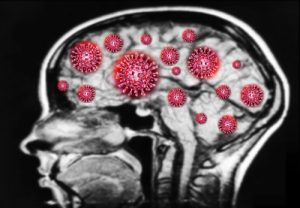
In order to gain a greater understanding of the long-term mental health impacts of COVID-19, U.S. Rep. Anthony Gonzalez (R-OH) sponsored legislation on Oct. 28 to support research on neurological and psychiatric illnesses associated with the virus.
Rep. Gonzalez introduced the Brycen Gray and Ben Price COVID-19 Neurological Impact Act, H.R. 5772, after the deaths of Northeast Ohio native Brycen Gray and Illinois native Ben Price earlier this year, both of whom had no history of mental illness but suffered from neurological illnesses caused by COVID-19, the congressman’s office said.
“While we’ve made great strides to further understand COVID-19 and its complexities, significant research gaps remain as to how and why this virus can hit the brain and trigger serious mental illnesses,” Rep. Gonzalez said. “My bill effectively closes these gaps and lays the groundwork for preventing and treating these illnesses in the future.”
Rep. Gonzalez was joined in unveiling the bipartisan bill with original cosponsors that included U.S. Reps. Adam Kinzinger (R-IL), Dave Joyce (R-OH), Peter Meijer (R-MI), and Susan Wild (D-PA). The legislation, if approved, would authorize the National Science Foundation (NSF), in consultation with the National Institutes of Health, to award grants on a competitive basis to support research on neurological and psychiatric conditions related to COVID-19.
Rep. Kinzinger noted that some families are struggling with the less-understood results of a COVID-19 diagnosis, including related psychiatric illnesses, which have led to suicide in some instances.
“After speaking to the Price family and hearing stories from other Members’ constituents, I knew something had to be done,” Kinzinger said. “I’m grateful to be a part of this bipartisan group and am hopeful that this legislation will be swiftly considered by Congress so we can get answers for these families and establish a strategy to prevent additional cases.”
As many as one in three COVID-19 patients experience a neuropsychiatric illness following infection, Meijer said, underscoring how much scientists still don’t understand about the coronavirus. “Engaging NSF in the research of long-term neurological effects of COVID-19 will be critical in our efforts to understand this virus,” Meijer added.
Anxiety and substance use disorders are among the more common symptoms of COVID-19, Rep. Gonzalez’s office stated, but researchers have also uncovered a number of serious complications such as psychosis, dementia, and brain hemorrhages.
“As we work to restore our way of life and recover from the COVID-19 pandemic, we cannot lose sight of the fact that many Americans are still suffering from the long-term, lingering effects of this virus,” Rep. Joyce said. “This bipartisan legislation will provide critical support to research centers that are working to better understand and address neurological and psychiatric illnesses associated with COVID-19. We must continue to fight for medical breakthroughs for the Americans struggling from the residual effects of COVID-19.”
The legislation is supported by the American Foundation for Suicide Prevention and the Children’s Hospital Association.



